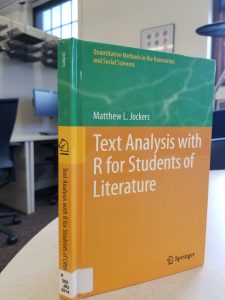My undergraduate degree is in Classical Humanities and French, and like many humanities and liberal arts students, computers were mostly used for accessing Oxford Reference Online and double checking that “bonjour” meant “hello” before term papers were turned in. Actual critical analysis of literature came from my mind and my research, and nothing else. Recently, scholars in the humanities began seeing the potential of computational methods for their study, and coined these methods “digital humanities.” Computational text analysis provides insights that in many cases, aren’t possible for a human mind to complete. When was the last time you read 100 books to count occurrences of a certain word, or looked at thousands of documents to group their contents by topic? In Text Analysis with R for Students of Literature, Matthew Jockers presents programming concepts specifically how they relate to literature study, with plenty of help to make the most technophobic English student a digital humanist.
Jockers’ book caters to the beginning coder. You download practice text from his website that is already formatted to use in the tutorials presented, and he doesn’t dwell too much on pounding programming concepts into your head. I came into this text having already taken a course on Python, where we did edit text and complete exercises similar to the ones in this book, but even a complete beginner would find Jockers’ explanations perfect for diving into computational text analysis. There are some advanced statistical concepts presented which may turn those less mathematically inclined, but these are mentioned only as furthering understanding of what R does in the background, and can be left to the computer scientists. Practice-based and easy to get through, Text Analysis with R for Students of Literature serves its primary purpose of bringing the possibilities of programming to those used to traditional literature research methods.
Ready to start using a computer to study literature? This book is available both physically and digitally from the University Library.


